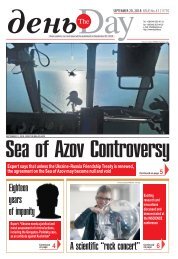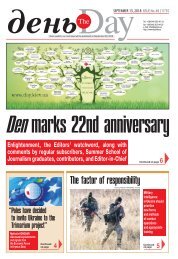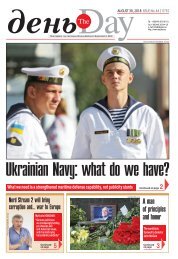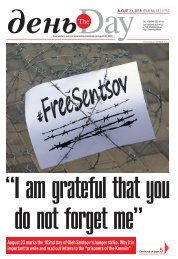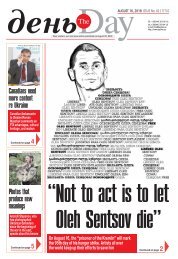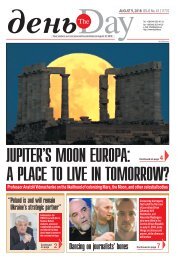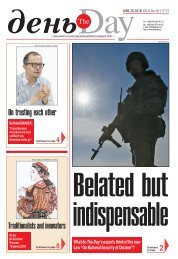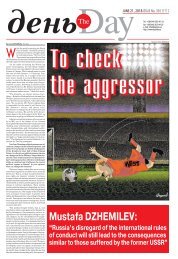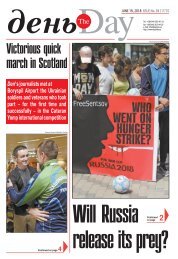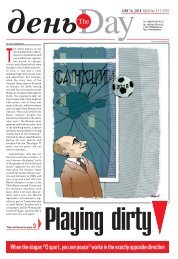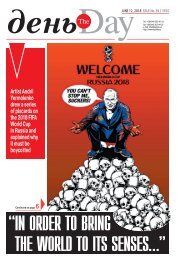#40_1-8
Create successful ePaper yourself
Turn your PDF publications into a flip-book with our unique Google optimized e-Paper software.
4<br />
No.40 JUNE 26, 2018<br />
TOPIC OF THE DAY<br />
WWW.DAY.KIEV.UA<br />
By Serhii MORUHIN<br />
Now, four years after the<br />
beginning of Russian aggression<br />
against Ukraine,<br />
we know like never before<br />
how important the reputation<br />
of our country abroad is. It is<br />
ordinary Europeans – Germans,<br />
Dutchmen, Frenchmen, Poles, et<br />
al. – who determine the policy of their<br />
countries. What they think of<br />
Ukraine makes a direct impact on<br />
high-placed politicians. On the other<br />
hand, Ukrainians are part of<br />
European civilization. Our history is<br />
bloody and tragic, we were torn away<br />
from European culture for a long<br />
time, and we lost a lot of lessons<br />
history taught to European countries.<br />
Now, after 26 years of in-dependence,<br />
Ukraine is only beginning to<br />
blaze the trail to Europe, and we<br />
must learn to understand Europeans<br />
better and improve the way we tell<br />
them about ourselves.<br />
Gerhard Gnauck is a German<br />
journalist who worked for the most<br />
influential publications. He currently<br />
contributes to the newspaper<br />
Frankfurter Allgemeine Zeitung and<br />
has been taking interest for many<br />
years in what occurs to the east of<br />
Germany. Herr Gnauck agreed to<br />
answer The Day’s questions.<br />
● “THOSE EVENTS<br />
‘PROGRAMMED’ MY<br />
INTEREST IN UKRAINE”<br />
Herr Gnauck, the Ukrainians<br />
are accustomed to Western Europe<br />
taking not so much interest in<br />
Ukrainian events. Why did you<br />
choose this subject?<br />
“My family is historically linked<br />
with Ukraine. My grandmother was<br />
born in Podillia, not far from Kamianets-Podilskyi.<br />
They were Polish<br />
and ran away from there in 1920. My<br />
grandfather, a German, was killed in<br />
Ukrainian Volyn on the eighth day of<br />
invasion in 1941. My father and I<br />
once came here to find his grave. All<br />
this could not help but stir up my interest<br />
in Ukraine. My mother is Polish<br />
and father is German. They took<br />
an active part in human rights struggle<br />
in the 1970s-1980s, and I heard<br />
such names as Hryhorenko,<br />
Dzhemilev, Stus, and others, since I<br />
was a child. Then I happened to travel<br />
to Ukraine in 1989 for the first<br />
time as part of a group of students<br />
and two professors. It was very interesting:<br />
we visited Chornobyl and<br />
the Bykivnia forest, the place of<br />
mass-scale executions of repression<br />
victims. All those events ‘programmed’<br />
my interest in Ukraine.”<br />
You were prepared for the events<br />
that followed the collapse of the Soviet<br />
Union and the emergence of independent<br />
Ukraine. But you were<br />
clearly in the minority in Germany.<br />
What is the attitude of Germans to<br />
our state?<br />
“I cannot possibly speak on behalf<br />
of all Germans, for I am just a journalist.<br />
Besides, I am dealing with foreign-policy<br />
matters very much. And,<br />
in general, it is an important topic,<br />
but I can outline several points that<br />
I think are characteristic. If you remember,<br />
there was a very well-known<br />
German Foreign Minister Hans-Dietrich<br />
Genscher. He recalls in his<br />
memoirs that he wanted to fly to<br />
Ukraine in July 1991, when he was on<br />
a fact-finding tour of the East. But,<br />
not to complicate relations with<br />
Moscow, Gorbachev, the delegation<br />
first flew to Kazakhstan and then, as<br />
if on the way back, visited Ukraine.<br />
I recalled these impressions of Genscher<br />
a few years later, in 1997,<br />
when I accompanied German President<br />
Roman Herzog. Again, we first<br />
flew to Kyrgyzstan and then to Kyiv.<br />
I remember speaking with a deputy<br />
minister, and he said German dele-<br />
gations had been visiting Ukraine in<br />
the mid-1990s and offering aid, particularly<br />
in the agrarian sector. But<br />
it was very difficult to speak to some<br />
of the Ukrainian officials, and nothing<br />
came out of that. It was also<br />
very important that the Soviet Union<br />
collapsed against the backdrop of a<br />
bloody conflict in former Yugoslavia.<br />
By contrast, the USSR broke up in a<br />
very peaceful way, thank God, but, as<br />
is known, there still were conflicts in<br />
Transnistria, Transcaucasia, and<br />
other hot spots.”<br />
Gerhard GNAUCK: “I hope Germans will understand<br />
what a difficult way Ukrainians had to go”<br />
● “I PERSONALLY, AS AN<br />
EYEWITNESS, WOULD<br />
EQUATE THE IMPORTANCE<br />
OF THE ORANGE<br />
REVOLUTION WITH THAT<br />
OF THE FALL OF THE<br />
BERLIN WALL”<br />
So, Europe did not pay much attention<br />
to Ukraine because it neither<br />
benefited from nor was harmed<br />
by the latter?<br />
“There were always some conflicts<br />
that attracted attention. And then<br />
the year 2004 came. I personally, as an<br />
eyewitness, would equate the importance<br />
of the Orange Revolution with<br />
that of the fall of the Berlin Wall.”<br />
It is high praise, especially from a<br />
German.<br />
“I can say this as a journalist, as a<br />
citizen. Along with the fall of the<br />
Wall, it is the most important event I<br />
was personally present at. I can remember<br />
my former classmate telling<br />
me how he perceived this. In Germany,<br />
Ukraine was on every TV<br />
screen. It suddenly appeared and<br />
stayed on for two or three weeks so.<br />
Then, also suddenly, it disappeared.”<br />
How did ordinary Germans react<br />
to this?<br />
“As to something uncommon, interesting.”<br />
So the Germans “discovered” the<br />
2004 Ukraine?<br />
“Yes. You should understand the<br />
importance of what occurred in 1989<br />
for the Germans. It was what the opposition<br />
in East Germany began with –<br />
election monitoring and the struggle<br />
against election rigging. Those were<br />
very easy-to-grasp things. And here,<br />
peaceful civilians are standing in the<br />
cold – every journalist noted at the<br />
time that it was very cold, especially<br />
for the Germans. And the people<br />
achieved their goal, which was also a<br />
very positive event. Then came the period<br />
when ministers of various coun-<br />
tries – for example, Germany and<br />
Poland, or Germany, Poland, and<br />
France – traveled to the East to jointly<br />
address some problems. I would<br />
single out the Polish minister Sikorski<br />
and Steinmeier who is now the<br />
President of Germany.”<br />
● “THE GERMAN MEDIA ARE<br />
AWARE THAT IT IS A<br />
CONFLICT BETWEEN<br />
UKRAINE AND RUSSIA, NOT<br />
A CIVIL WAR”<br />
But the year 2004 is not our last<br />
revolution, is it? The 2004 events<br />
continued in 2013-14. Ukraine was on<br />
every TV screen again. How did the<br />
German public react to this?<br />
“First of all, when there was a<br />
peaceful phase of the face-off, things<br />
were very easy to grasp. Peaceful<br />
civilians stood up for their rights,<br />
Euro-integration, etc., and it was<br />
viewed positively. No matter what<br />
the German media wrote, everything<br />
was good before the bloodshed. I even<br />
remember quite an unbiased report on<br />
Ukrainian nationalism. Nationalism is<br />
a very sensitive matter in Germany,<br />
but in this case everything was very<br />
well balanced, much to my surprise.<br />
Then TV showed the footage of tires<br />
burning on Hrushevskoho St. As far as<br />
I know, there was only one place,<br />
where tires were burning – the whole<br />
city was not on fire. But, naturally,<br />
such pictures produce a negative effect.<br />
The next footage: a shootout on<br />
Hrushevskoho St. and a major bloodshed<br />
on Independence Square and Instytutska<br />
St. I personally think this<br />
greatly influenced the perception of<br />
Ukraine – it began to be associated<br />
with violence. ‘Who started it? Who<br />
is to blame? All are more or less guilty.<br />
Radicalization, escalation, you<br />
know…,’ viewers used to say. This<br />
must have been the turning point in<br />
German public opinion – there was a<br />
violent conflict on the streets.”<br />
Did German public opinion turn<br />
away from Ukraine?<br />
On trusting each other<br />
Photo by the author<br />
“Of course not. I must tell those<br />
who are scathingly criticizing the<br />
German media that it is not quite so.<br />
There were about 30 major talk shows<br />
on German TV about the situation in<br />
Ukraine. This means that this problem<br />
really worried everybody. I remember<br />
a talk show hostess I know asking<br />
Angela Merkel if the Minsk Agreements<br />
would be followed by Minsk 2,<br />
Minsk 3, and so on. And Madam Chancellor<br />
had to answer – she said there<br />
was no other way out; it’s better this<br />
way than another. There was also a<br />
talk show attended by the minister of<br />
defense. The question was about kidnapping<br />
Bundeswehr soldiers who<br />
were part of the OSCE mission. Madam<br />
Minister answered that it was not accidental<br />
and the conflict was growing.<br />
We can also recall that there were several<br />
German journalists at the Ukrainian<br />
army barracks in Crimea, when the<br />
‘little green men’ were going to take<br />
them by storm – they came out only<br />
when there was a real danger that they<br />
will suffer. And some of my colleagues<br />
received mailed threats of bodily harm<br />
for spotlighting the Ukraine conflict<br />
from an excessively ‘anti-Putin’ position.<br />
This looked very strange because<br />
we had previously thought that<br />
threats could only be issued against the<br />
journalists who write about the mafia,<br />
not about politics. Some politicians<br />
said important words. President<br />
Joachim Gauck said in Gdansk: history<br />
teaches us that when we try to appease<br />
the aggressor, this will only whet his<br />
appetite, and he will want still more.<br />
Or take the Minister of Finance, Wolfgang<br />
Schaeuble. Once the aggression<br />
in Crimea began, he said, speaking to<br />
schoolchildren, that it was comparable<br />
to 1938 [the annexation of Germanspeaking<br />
regions of Czechoslovakia. –<br />
Ed.]<br />
But we sometimes also read different<br />
opinions in the German press.<br />
“There are various opinions. But,<br />
on the whole, the German press is<br />
unanimous that Crimea was annexed –<br />
it is an undeniable fact. This formulation<br />
is used by the information agencies<br />
that set the tone in the journalistic<br />
milieu. Certain media try sometimes<br />
to present the conflict as a<br />
‘proxy war’ between puppets on both<br />
sides, a clash between Putin and God<br />
knows who in the West because Trump<br />
can hardly make the grade of a global<br />
villain. But it seems to me that, on the<br />
whole, the German media are aware<br />
that it is a real conflict between<br />
Ukraine, as a nation and a state, and<br />
Russia, as a state, and that it is not a<br />
civil war, but one brought in from<br />
abroad.”<br />
● “I SHARE YOUR FEARS THAT<br />
‘NORD STREAM 2’ IS<br />
INTENDED TO HINDER THE<br />
TRANSIT OF GAS ACROSS<br />
UKRAINE”<br />
Ukraine suffers very much from<br />
Russian propaganda. Since 2014, or<br />
even earlier, Russia has been spreading<br />
biased, sometimes fabricated,<br />
information about predominance of<br />
the far Right, the oppression of minorities,<br />
and all kinds of provocative<br />
fakes. To what extent strong is the<br />
stereotype of Ukraine as a country,<br />
where nationalists rule supreme and<br />
ethnic minorities are harassed, and<br />
to what extent do the Germans believe<br />
these allegations? To what extent<br />
harmful are such excesses as, for<br />
example, the devastation of a Roma<br />
camp and similar stories?<br />
“I see. As you know, this story began<br />
in 2003-04. The first to criticize<br />
Chancellor Schroeder for this project<br />
was Polish President Kwasniewski.<br />
They even fell out over this. Schroeder<br />
signed this agreement as a chancellor<br />
and then, after the elections,<br />
assumed a top executive office in<br />
Nord Stream. All this occurred well<br />
before the 2005 elections. The elections<br />
catapulted Angela Merkel to<br />
power. It was too late to go back, for<br />
major German companies were involved<br />
in this. Let us recall that the<br />
world was different at that time.<br />
Russia was different, too. The Kremlin<br />
leadership may have been preparing<br />
for this kind of scenarios, but in<br />
that period, the first four or five<br />
years, everything looked nice and<br />
comely.”<br />
Still, I would like to know the extent<br />
to which German people are<br />
aware of the threat the commissioning<br />
of Nord Stream 2 poses to<br />
Ukraine.<br />
“Unfortunately, many articles<br />
I’ve read in the past few months allege<br />
that Poland and Ukraine are<br />
protesting against building the second<br />
segment of Nord Stream because<br />
they are afraid to see their gas transit<br />
capacity reduced. But Gazprom<br />
and President Putin emphasize that<br />
the quantity of the gas transported<br />
now across Ukraine will remain unchanged.<br />
German newspapers wrote<br />
that Ukraine and Poland were afraid<br />
to lose revenues or even were ‘afraid<br />
of being offended.’ This essentially<br />
distorts Ukraine’s position and presents<br />
the two states as hurt children.<br />
But, on the other hand, the current<br />
security situation totally differs<br />
from the one 10 years ago. Now there<br />
are interconnectors, and gas can run<br />
in the reverse mode to Ukraine<br />
through Poland and Slovakia. The<br />
seller is not Russia, not Gazprom, but




